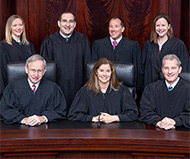5/9/2019
Michigan Supreme Court Expands Passenger RightsMichigan Supreme Court restores Fourth Amendment rights to passengers during traffic stops.

Passengers riding in cars pulled over by Michigan police officer now have the right to contest searches of their property. In a ruling last month, the state Supreme Court was unanimous in finding a search of the backpack belonging to passenger Larry Gerald Mead violated his constitutional rights.
The case began on May 29, 2014, after Jackson Police Officer Richard Burkart saw the car being driven by Rachel Taylor had an expired plate. Mead, whom Taylor had only just met, was in the passenger seat, holding the bag on his lap. The officer ordered Taylor to pull over. Taylor's license was expired, so the Officer Burkart decided, instead of arresting Taylor, to get her consent to a search of the car. Taylor gave permission for the search.
Mead was ordered to get out, and he left his backpack on the floorboard. The officer never obtained explicit permission to look into the bag, but when she did so she found that it contained 10 grams of marijuana and 4 grams of methamphetamine. To avoid spending up to ten years in jail on the possession charge, Mead tried to have the search of his bag thrown out as a constitutional violation. The Michigan Supreme Court in 2007 had ruled in nearly identical circumstances that passengers had no expectation of privacy in the car owned and driven by someone else and thus had no standing to challenge the search. The high court rejected the old ruling last week.
"In its place, we reaffirm that a person -- whether she is a passenger in a vehicle, or a pedestrian, or a homeowner, or a hotel guest -- may challenge an alleged Fourth Amendment violation if she can show under the totality of the circumstances that she had a legitimate expectation of privacy in the area searched and that her expectation of privacy was one that society is prepared to recognize as reasonable," Chief Justice Bridget M. McCormack wrote for the court.
The court found that the backpack was a personal item belonging to Mead, which was clearly demonstrated by his clutching the item in his lap during the stop. The officer testified that she believed the bag was Mead's.
"Taylor was like a rideshare driver who has only short-term contact with passengers -- an objectively reasonable officer would not believe (absent unusual circumstances) that an Uber driver could consent to the search of his passenger's purse, for example," Justice McCormack wrote.
Without explicit consent from the bag's owner, the court concluded the search was illegal and ordered the drug evidence suppressed. A copy of the ruling is available in a 150k PDF file at the source link below.


